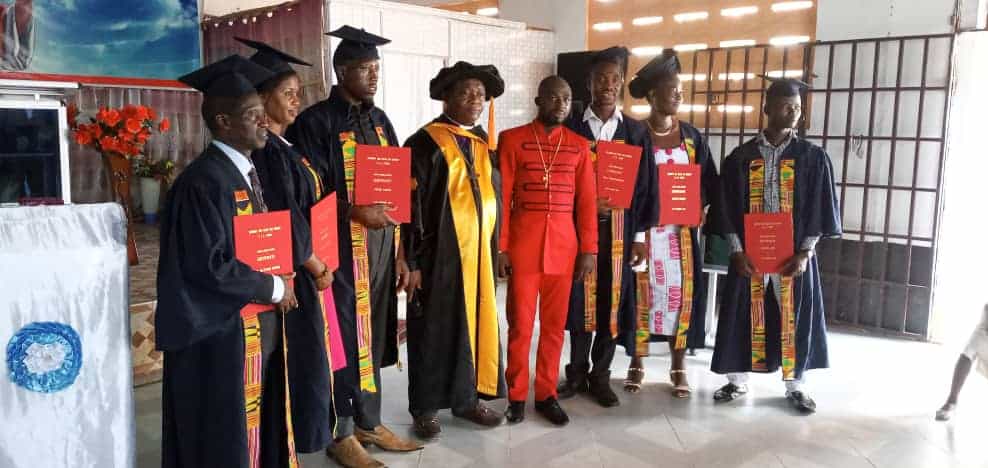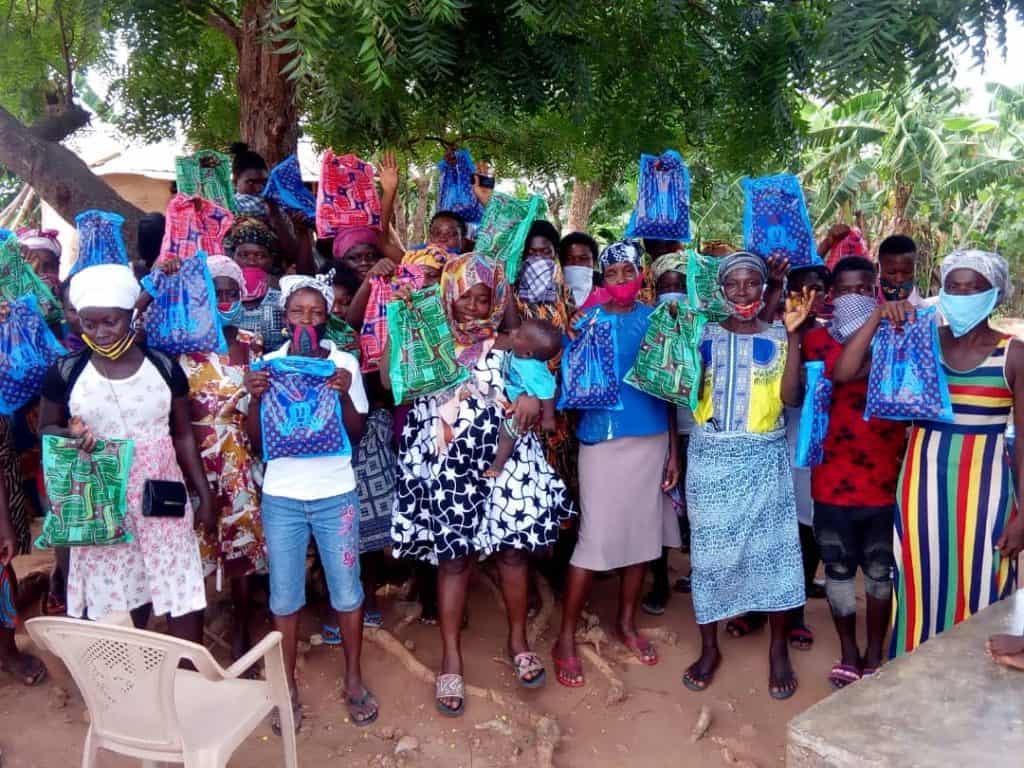Establishing the New Diocese
Bishops
Clergy
Congregants
The Continuing Evangelical Episcopal Communion in Ghana began with 170 clergy and their several churches, with most of the ministers well versed in a background that is heavily focused on the evangelical message of the Gospel of Jesus, albeit presented from the focus of a charismatic and Pentecostal background. Through foundational training, Bishop Daniel is leveraging his extensive educational background and establishing formation in the sacramental stream. This process of teaching and implementing the balance of convergence spirituality will raise spiritual leaders into their roles as deacons and priests, creating a convergent culture in their churches and planting more New Testament convergent churches. It is the need for this foundational training that led to the decision to continue the diocese in a missionary status, even though the number of clergy and churches are quite large.
CEEC.CHURCH Diocese of Ghana & Togo distributed 35 bags of rice to families in the Accra area to help face food challenges due to COVID-19. In the video, one of the women who recieved food stepped forward to give thanks to God for those who cared enough to send funds.
Alongside issues of food needs, projects that will deliver quality water are essential. One goal is the establishment of a community wash room and bath facility. Literacy needs are high, and there’s significant need to create training opportunities that lift the level of adult education and develop foundational skills that will enable better employment opportunities.
GHANAIAN WOMAN STEPS OUT TO GIVE THANKS
Serving The Community
Bishop Daniel Shares His Perspective
He is the embodiment of varied experiences spanning over the past several decades in Ghana. A Minister of the Gospel, an Educator, and a recognized Christian leader in his nation, Bishop Daniel is leveraging his connections within the nation to promote CEEC.CHURCH programs and activities across the 16 regions of Ghana.
We connected with Bishop Daniel and passed along a few cogent questions.
How has the church changed and developed in Ghana and Togo in the last decade?
Colonial rule established the modern state Ghana. Ghana was conceived as a secular state, Christianity was identified with colonial rule. Consequently, the Ghana Catholic Bishops’ conference (GCBC), the Christian Council of Ghana (CCG),and the Ghana Pentecostal and Charismatic Council (GPCC) all exert enormous political and moral influence on the Ghanaian polity.
The Charismatic and Pentecostal churches in Ghana and Togo have experienced new change in the areas or style of worship, singing spiritual songs, praying in tongues and clapping of hands in prayer times have changed mode of worship. We are developing in the areas of exercising prophetic gifts in the course of worship service. Giving of enough time of the preaching of the Gospel under the anointing and power of the Holy Ghost. Understanding the proper place of the sacraments will add another dimension to our churches.
What unique elements of the CEEC.CHURCH do you think may fit well in the Ghanan and Togo culture?
The elements of CEEC.CHURCH that fit in the Ghanaian and Togo culture are the CEEC.CHURCH ‘s focus on being prayerful. The Communion’s recognition of the ministry of the Holy Spirit, especially praying in the spirit speaking with tongues, resonates with our culture.
The CEEC.CHURCH ‘s expressive worship expressions also connect on multiple levels with the Ghanaian and Togolese people. Africans as a whole generally love to sing and dance; and this is especially true in west Africa. We carry that love for music and dance to many different types of music. We love hymns and spiritual songs, and we dance before the Lord to these and also more modern types of worship music.
Dancing allows us to enter into His presence with our hands and feet, arms and legs – not just our voices.
How do your churches typically evangelize new areas?
For most of our existence, we have followed the dictum that the work of evangelism begins from house to house before we conduct larger crusades in the town square. (Of course public crusades and other social gathering are still under ban due to COVID-19. But this will eventually pass.)
We begin exploring new areas by sending a team to conduct spiritual mapping. It gives overview of research of the physical and spiritual background of the new area. This is followed by a series of prayer concerts designed to break the grounds by involving the indigenous in the area.
The solar-powered evangelism backpack with the Jesus Film and other evangelism and discipleship materials will be used when we are allowed to engage in large public events to present the Gospel of Jesus Christ and engage the people of the community.
How are you dealing with the need for formation of clergy?
We have beginner and advanced discipleship classes for everyone. We operate a Bible college program that offers certificates and diplomas for candidates to learn more about ministry and how to serve better.
Our Community Bible College and Seminary prepares the candidates for ministry. Afterwards, deacons and priests are assigned to churches within the diocese for practical training before assigning them to particular church.
We have need of more leadership formation, so we can create a more conducive learning process. We lack a single, well- equipped classroom; but pray that we’ll be able to construct one to make studies accessible.
What are the biggest challenges to developing community within the body of Christ in the diocese?
Literacy, as I said before, is a major barrier, and it is a high one. We use the Bible as one tool to train people to read, and this impacts them on multiple levels.
One means of developing community is a plan we have to establish have our church double as a centre for functions (for example weddings and conferences) which organization can use. The cost can be offset by people paying affordable fees. This creates a place for the community to connect with one another AND to connect with the church.
This could also double as a retreat centre for Christians to meet to pray, fast, and to seek the face of God. Many churches in the community would use this, and help cover costs by paying affordable fees for using the facility.
Where are the areas you hope to see the greatest growth?
Ghana and Togo claim to be about 70% Christian. But, like in the USA, many people who profess to be “Christians” are only culturally so. They do not have a vibrant, active faith that affects their daily lives.
There’s more to be done to mature Christians in both countries. Among biblical churches we still see people holding on to African traditional religion. These traditional religions are even practiced by some churches, including false doctrines. This has to be stopped.
Despite these teachings, God is at work raising strong teaching among Christians to bring correction and strengthen the foundation of the Bible as the Word of God. This is where we see true change coming to people’s lives.
Education

Education plays a major role in the development of the diocese.
It allows the next generation an opportunity to discover their role in the Lord. Properly focused educational training unearths talents, developing gifted people who are equipped to feed the nations.
Today the greatest investment in our churches is reaching out to youth in educational institutions from junior high schools and senior high schools to universities. The results of these outreaches have allowed youth to answer the call of God over their lives, with some even becoming Tent Ministers.

Revival
True revival brings lasting changes the communities it touches.

During the 1970’s we saw churches spending much time with the word of God. In the the 1980,s we saw an increase of charismatics independent churches spring forth with speaking in tongues and great worship (which I enjoyed). This led to more powerful preaching of the Gospel.
In the 1990’s there was a wave of the Apostolic and Prophetic ministry, which included the initial introduction of the Episcopals and Anglicans to the Charismatics and Pentecostal churches. Some of the leaders under this wave have been a blessing and others have led others to confusion, which must be corrected.
The balance that the CEEC.CHURCH brings, combined with the structure of our Canons and historic practice, will help to address the confusion and establish proper order.